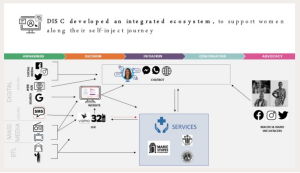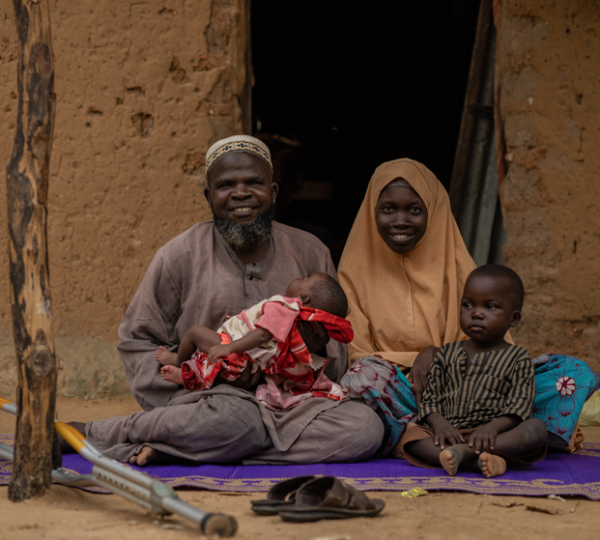Harnessing Digital Health to Facilitate People-Centred Healthcare and Stronger Health Systems
By Elizabeth Adeyemo
Over the past 20 years, technology has dramatically revolutionised sectors and the global economy. It has changed how we work, innovate, and solve problems and has made our lives easier, faster and more efficient. Yet, the health sector is lagging. We have yet to harness the potential for digitising health to manage limited resources and improve public health.

What is digital health?
Digital health is an intersection of technology and health. It’s about bringing digital transformation to health care through disruptive technologies, in the form of hardware such as smart wearables (smart health watches, wearable ECG monitors, and biosensors) and screening devices; software, such as mHealth applications, electronic health records, behaviour change interventions, and e-training; and services that combine both hardware and software to provide comprehensive healthcare and improve health outcomes.
Digital transformation in healthcare: opportunities and challenges
Health systems in low- and middle-income countries (LIMC) are characterised by extreme fragmentation and weakness, inadequate resources with a shortage of competent health workforce necessary for effective healthcare delivery. Digital technologies provide vast opportunities to support the growing needs of the health system, support health workers, accelerate universal health coverage and substantially transform healthcare delivery.
Digital technologies can help significantly minimize the waste of resources associated with unnecessary practices, redundancies, and other inefficiencies, thereby improving the capacity to save money and more lives. It can help researchers create safe and effective treatments, strengthen disease prevention efforts, and improve population health. However, digital technologies alone can never be as powerful as digital technologies guided by a robust strategy within the broader health ecosystem that includes and harmonizes or integrates leadership and governance, health workforce, financing, information systems and technologies.
In LMICs, digital health interventions may be challenging to implement due to many reasons ranging from inoperability, not being suited to the country’s needs, context and systems, poor management, inadequate training, and an inability to sustain and scale up. SFH is leveraging digital health technology to design and implement innovative, scalable public health interventions to accelerate access to quality, affordable and equitable care, broaden health coverage and support stronger, sustainable health systems. We do this by using a human-centred design approach to execute solutions tailored to the existing needs and context and partnering with key stakeholders to deploy these solutions.
Transforming healthcare delivery through digital health
Digital self-care companion for sexual and reproductive Health
Sexual and Reproductive Health (SRH) issues constitute a significant burden in low- and middle-income countries and are a leading cause of ill health and death for women and girls of childbearing age. In the last 37 years, SFH has consistently implemented projects that contribute to expanding family planning (FP) utilisation and reproductive health (RH) in Nigeria.
In an effort to empower consumers and accelerate global progress toward better SRH outcomes, SFH (with funding from the Children Investment Foundation Fund (CIFF)) is currently implementing the Delivering Innovation in Self-Care (DISC) project in 15 states and in Nigeria. DISC seeks to democratize access to Sexual and Reproductive Health and scale-up quality self-care options, starting with Depot Medroxy-Progesterone Acetate-Subcutaneous (DMPA-SC). DISC developed, pretested, and launched an integrated consumer ecosystem – a communication suite, i.e., Digital companion and Interactive Voice Response for SRH that creates awareness of self-care and builds agency and intent of consumers to initiate self-care.

This powerful digital companion integrated with a consumer feedback mechanism provides consumers with access to pre-recorded content on SRH and Family Planning (FP) and overall support to women along their self-inject journey.
Interactive e-Learning curriculum to aid capacity-building
Building the capacity of healthcare workers is critical to bridging the care gap for Adolescents and Young Persons, including key populations and improving overall health outcomes. SFH, in collaboration with Tech Care for All and key stakeholders, developed a digital learning curriculum and platform for improving providers’ knowledge, skills, and attitude toward offering quality Sexual and Reproductive Health and Rights (SRHR) services to adolescents and young persons, including key populations. This e-training curriculum can be accessed on the Medical Learning Hub (MLH).
SFH is currently implementing this project – the Grand Challenges Canada – Adolescents and Young Persons (GCC-AYP) project – in Abia and Bauchi states. To bolster this project, selected young community influencers called Champions identify, inform, and refer target populations to trained healthcare providers for unbiased SRHR services.
Digital training to strengthen the capacity of Family Planning and LARC Providers to offer hormonal IUD services.
SFH has one of her founding principles to support and increase access to modern contraceptive services and, by extension, contribute to reducing the high burden of maternal mortality in Nigeria. SFH supports family planning and spacing in many ways, including improving the capacity of health care providers to offer family planning and child spacing information and services, as well as increasing knowledge and positive attitudes toward modern child spacing methods.
SFH recently implemented the USAID-funded Research for Scalable solution (R4S), together with the Learning about Expanded Access and Potential of the LNG-IUS (LEAP LNG-IUS) Initiative, a Bill and Melinda Gates Foundation award led by FHI360 in partnership with PSI. Through the R4S/LEAP project, SFH developed a digital training tool to strengthen the capacity of existing family planning and long-acting reversible contraceptive (LARC) providers to offer hormonal IUD services among the full range of available method options. This training tool consisted of 13 modules that detailed Hormonal IUD characteristics and steps on usage.
Also, voiceover recordings were developed by SFH staff members on the project to ensure ease of self-paced study and knowledge retention. After successfully completing the digital training, providers were clustered for an in-person practicum on using models and subsequently competency-based clinical supervision with actual clients by state-based Master trainers. A concurrent evaluation was carried out to evaluate the competence, knowledge, acceptability and feasibility of a digital training course on hormonal IUDs for Family Planning providers in selected public and private sector providers in the 3 implementing states. There was over 80% acceptability of the approach and a high level of knowledge gain.
Driving digital health innovations
Digital transformation and innovations are advancing at unparalleled levels and bring enormous benefits to healthcare systems. This is especially needed in a time of overburdened and under-resourced health systems exacerbated by the double burden of infectious diseases like HIV and TB and the increasing prevalence of non-communicable diseases like hypertension and diabetes.
SFH is redefining health and community systems by integrating sustainable digital innovations to improve health outcomes and achieve healthier, productive lives for all. This includes everything from developing digital health platforms that support health for all and health systems strengthening to deploying eHealth, such as ePharmacy through its social business enterprise.
For more information, email us at info@sfhnigeria.org




